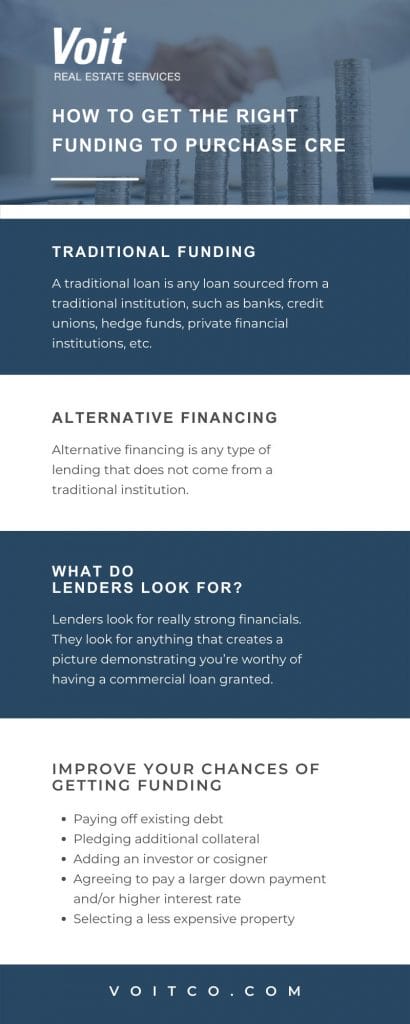
Are you a CRE investor or business owner looking to purchase commercial real estate? Whether you’re looking for office space, a warehouse, or any commercial property, the process of securing a loan can be long and strenuous. Many businesses don’t know where to start.
In this article, we’ll discuss how to get the right funding to purchase commercial real estate, including traditional funding options, alternative financing, and what lenders look for when financing CRE loans.

Traditional Funding
So, you want to purchase commercial real estate. Chances are, you don’t have the cash upfront and thus, a loan is necessary.
So, what is traditional (or conventional) funding? A traditional loan is any loan sourced from a traditional institution, such as “banks, credit unions, savings and thrift institutions, life insurance companies, hedge funds, pension funds, private financial institutions,” the list goes on according to Commercial Loan Direct.
Traditional loans are often what come to mind for most when thinking about funding a CRE purchase. Each institution, whether it be a bank, credit union, or private financial institution, has a different set of criteria for loan approval. Some of these criteria might include:
- Minimum credit scores
- Maximum loan amounts
- Sufficient credit history
Each of these requirements varies from institution to institution. This being said, it can be very difficult to gain loan approval through traditional funding. In fact, Forbes reported that in 2019, commercial banks only approved 27.3% of submitted loan applications.
The truth of the matter is that some business owners and/or CRE investors may not qualify for a traditional bank loan. This is when alternative financing comes into play.
Alternative Financing
When the chances of securing traditional funding aren’t looking too bright, one might turn to alternative financing to support their investment instead.
So, what is alternative financing? Alternative financing is any type of lending that does not come from a traditional institution.
The benefits of alternative financing include:
- Quicker turnaround
- More flexibility
- Simpler application process
A quick turnaround is a huge plus for many investors and business owners who need capital on the fly. In some cases, with alternative financing, your project can be funded in as little as a few days following the application process.
So, what does alternative financing look like? Some examples of alternative financing include:
- Hard Money Loans (typically funded by private investors)
- Crowdfunding
- Lines of Credit
- Asset-Based Loans
- Bridge Loans
- Private Money Loans
Of course, there are additional types of alternative financing not listed.
What Do Lenders Look For?
In a company, lenders look for really strong financials, including assets, lines of credit, letters of credit, and so on. Essentially, they look for anything that creates a picture demonstrating you’re worthy of having a commercial loan granted.
There are two primary categories that lenders look at before granting a commercial loan (in addition to the property being financed itself). These categories include:
- Business Finances
- Personal Finances
Here are some questions to ask yourself and/or points to consider about each in preparation.
Business Finances
Does your business have the cash flow necessary to repay the loan? What is your credit score?
Personal Finances
Commercial lenders will also check your personal credit score and history. This will give them insight into any financial problems you may have previously encountered, including low credit scores, foreclosures, tax liens, defaults, court judgments, etc.
The more dings you have, the lower your chances of being approved for funding.
How to Improve Your Chances of Getting the Right Funding
If things aren’t looking as promising as you’d hoped after reviewing your business and personal finances, consider taking these steps, as recommended by Value Penguin:
- Paying off existing debt and taking other steps to improve your credit scores
- Pledging additional collateral if you have it
- Adding an investor or cosigner
- Agreeing to pay a larger down payment and/or higher interest rate
- Selecting a less expensive property
Attaining the right funding for your CRE investment is only one step in the many steps it takes to become a CRE owner. At Voit, we believe in assisting our clients through every step of the process. We invest in our client’s experience and aim to ensure the CRE investment process is seamless. What do you need to look for in the right CRE broker? Check out one of our recent blogs, describing the top 10 qualities to look for in your broker.